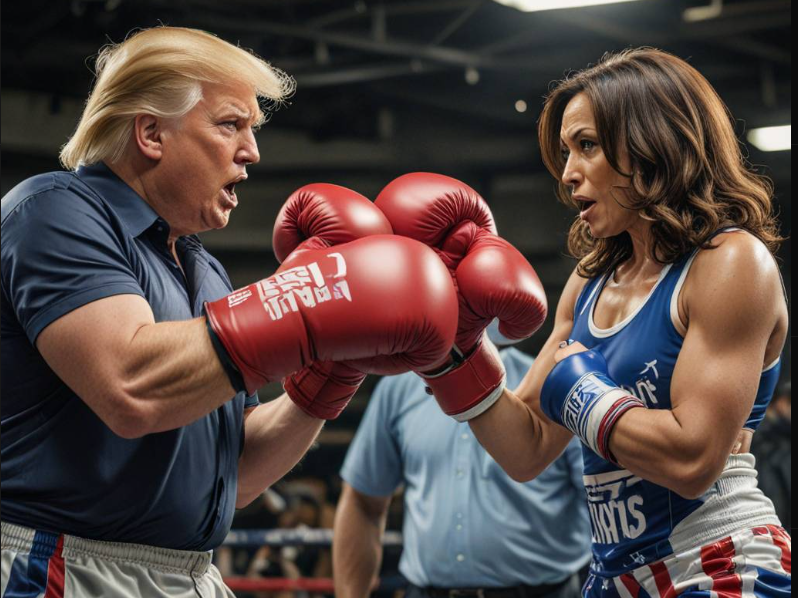
I watched the recent debate between former US President Trump and Democratic Party nominee Kamala Harris. It was hilarious to the core. I remember watching US Presidential Election debate twelve years ago between Barack Obama and Mitt Romney which had so much substance and wonder today how the standards of such debates have stooped so low. Trump who looked like he had mellowed down since his last presidential stint, made a complete clown of himself mid-debate when he suggested that Asian immigrants are eating pet dogs and cats of Americans. Kamala Harris on the other hand was more articulate and used her rich experience of the legal world to knock Trump out in each and every argument and showed the viewers who is really capable of becoming the Commander-in-Chief of the United States’ forces. However the entire debate showed the United States politics in a hysterically poor light.
Now, as an Indian, it would be a matter of pride if Kamala wins this election, RIGHT! given her Indian heritage. But the real question is, is it really going to be beneficial for our relations with the US to have an Indian-American as a President? The answer is simply NO, and the major reason would be the party she belongs to. Read further below to understood ‘WHY’.
As a common citizen of India, if you ask me to analyze the relationship between the United States and India, I would say it is a confusing one. There was a time when the US-India relationship was termed as a relation between two estranged democracies with common goals but still both the countries found themselves on the opposite sides of Global Politics. This changed significantly after 9/11, where both parties of US politics started courting India for many reasons. Traditionally, it’s the Republican Party that has been more active in building strong ties with India, with President George W. Bush playing a resolute role in cementing this relationship. His administration’s key achievement was the U.S.-India Civil Nuclear Agreement in 2008, which was the essential turning point of India-US relations.
President Bush the ‘Dubyaman’ realized India’s strategic importance on the global stage and its potential as a key ally in promoting democracy and stability, particularly in Asia. India is a non-signatory to the Nuclear Non-Proliferation Treaty (NPT), which means that we are free to use nuclear energy the way we want without unnecessary and discriminatory pressure from outside. Bush along with Manmohan Singh championed the civil nuclear deal, allowing India access to nuclear technology and fuel for civilian energy purposes. This agreement effectively ended India’s nuclear isolation, acknowledging its strong non-proliferation record and positioning it as a crucial democratic counterbalance in the region. This deal breathed a new life into the relationship of these two estranged democracies, without succumbing to the criticism from those who unnecessarily cribbed it might undermine global non-proliferation efforts. Bush-Manmohan Singh’s vision was not just limited to cooperation on Nuclear Energy but also in areas of other global challenges like terrorism, climate change etc., which is why there was so much relentlessness on both sides to make the nuclear deal successful.
In contrast, the Democratic Party has no such feathers in its cap with respect to India relations (apart from certain people swooning over Barack Obama’s exemplary oratory skills). While Democratic administrations have continued to build upon the foundations laid by their Republican predecessors, but except for Barack Obama, no other Presidents from the Democratic Party has been able to live up to the standards set by the Republicans. This cautious stance and traditional reluctance to fully embrace India as a strategic partner has made the US foreign policy commanded by Democrats seem lackluster, especially in comparison to the more enthusiastic outreach from Republican leaders.
While Harris’s Indian background might help in enhancing the cultural bonhomie, but it would not in any way mean that US will back India unquestionably on all global matters. This clearly indicates how both parties consider the US-India relationship. If Kamala Harris wins this election, which is looking like a real possibility after a ridiculous show by Donald Trump, it would be exciting to watch how our Indian American ‘Chitthi’ would maneuver through this quagmire without damaging the legacy of Bush-Manmohan Singh’s famous nuclear deal.

Reticent Writer, Software Consultant, Literary Wallflower 🙂
A Digital Recluse